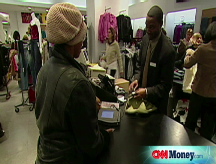The Fed's rate dilemma
Interest rates likely on hold for a while as worries about economic weakness and inflation leave central bank with few good options.
 |
| Fed Chairman Ben Benanke and the central banks' other policy makers have few good answers to economy's problems. |

NEW YORK (CNNMoney.com) -- Federal Reserve Chairman Ben Bernanke talked about the risks posed by both further economic weakness as well as inflation in testimony to Congress last month.
But if the Fed leaves interest rates unchanged on August 5, that will probably be viewed as an admission that it is pretty powerless to do much about either problem right now.
Most market experts believe the weakness in the economy will keep the Fed from raising interest rates Tuesday.
Still, inflation pressures are likely to keep the Fed from cutting rates any time soon either since more rate cuts could weaken the dollar and spark another big spike in oil prices
"I think the Fed is not really part of the equation any more because of the corner they've painted themselves into," said Rich Yamarone, director of economic research at Argus Research.
The central bank cut its key fed funds rate seven times between last September and this April in an effort to keep the economy from weakening significantly in the wake of the housing slowdown and credit crisis rattling Wall Street and Main Street.
The fed funds rate is an overnight bank lending rate that helps determine how much consumers pay for many types of loans as well as the prime rate used to peg the rates paid on certain business loans.
The Fed left this rate unchanged at 2% at its meeting in June.
But some economists have argued that the previous rate cuts are a reason behind the surge in commodity prices.
Yamarone thinks that the Fed should be most concerned about inflationary pressures. In other words, he believes its next move should be to raise rates.
He said inflation is one of the biggest threats to economic growth. If oil, food and other commodity prices keep soaring, it can dig into future growth as much as any troubled industry sector.
But David Wyss, chief economist at Standard & Poor's, thinks economic weakness should be the biggest worry.
"Public enemy no. 1 is still a recession," Wyss said.
To that end, even though the government reported Thursday that gross domestic product, the nation's economic activity, jumped 1.9% in the second quarter, few would argue the economy is firing on all cylinders.
After all, GDP grew less than 1% in the first quarter and fell slightly in the fourth quarter of 2007. In addition, the number of Americans filing for initial jobless benefits rose to a five-year high this week.
The government reported the seventh-straight month of job losses Friday while most auto manufacturers reported their ninth straight month of lower sales.
Finally, fears about more problems affecting the nation's banks and Wall Street firms have resurfaced since the Fed's last meeting. Banks and brokers reported collective losses of nearly $8 billion for the second quarter, versus profits of $38 billion a year ago, according to earnings tracker Thomson Reuters.
Fannie Mae (FNM, Fortune 500) and Freddie Mac (FRE, Fortune 500), the two mortgage finance firms that are crucial to the housing and credit markets, have seen their stocks plunge to such levels that Congress recently authorized a blank-check bailout of the firms by the Treasury Department if needed.
Add all this up and it's hard to imagine the Fed raising rates in the near future, especially since most think the problems in financial markets is what prompted the Fed to start cutting rates last September. Wyss said he doesn't believe the Fed will start raising rates until next spring at the earliest.
Still, with the fed funds rate at a relatively low 2%, even Wyss doesn't think the Fed will cut rates anytime soon. He said there would need to be "at least a couple of months of really disastrous jobs numbers" for the Fed to consider cutting rates again. ![]()


